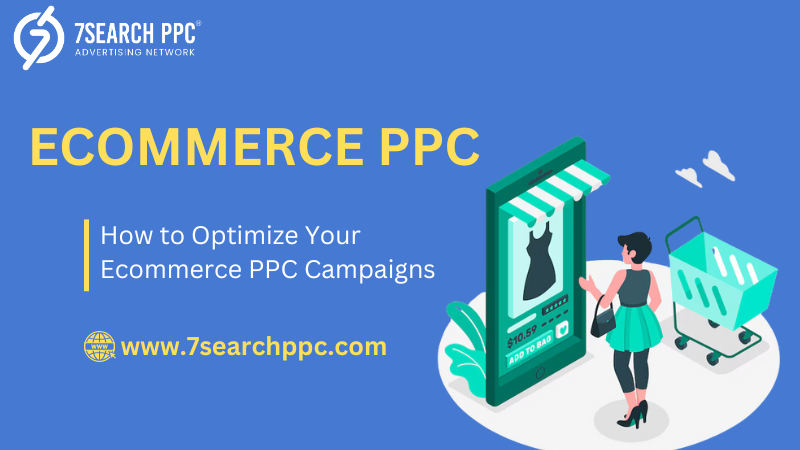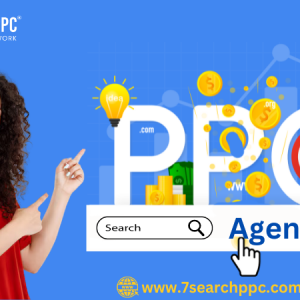In today's competitive digital landscape, running effective PPC (Pay-Per-Click) campaigns is crucial for e-commerce businesses looking to increase visibility, drive traffic, and ultimately, boost sales. As more businesses flock to online platforms, the need to stand out becomes increasingly important. This is where optimizing your Ecommerce PPC campaigns becomes essential. By fine-tuning your strategies and leveraging the right tools, like 7Search PPC, you can ensure that your ads reach the right audience at the right time, maximizing your return on investment (ROI).

Understanding Ecommerce PPC
Ecommerce PPC is a type of online advertising where businesses pay a fee each time one of their ads is clicked. Unlike traditional advertising, where you pay for the ad space regardless of performance, PPC allows you to only pay for actual clicks, making it a cost-effective option for driving targeted traffic to your e-commerce site.
PPC for ecommerce typically involves platforms like Google Ads, Bing Ads, and specialized ad networks like 7Search PPC. These platforms allow you to create ads that appear in search engine results, on social media platforms, or across a network of partner websites. When optimized correctly, these ads can significantly increase your site's visibility and drive high-quality traffic that is more likely to convert into sales.
The Importance of Optimizing Ecommerce PPC Campaigns
Without proper optimization, your PPC campaigns can quickly become a drain on your budget with little to show in return. Optimization involves analyzing and adjusting various aspects of your campaign to improve its performance. This includes targeting the right keywords, creating compelling ad copy, and adjusting bids to maximize your ROI.
Here are some key steps to optimize your Ecommerce PPC campaigns:
1. Keyword Research and Selection
Effective keyword research is the cornerstone of any successful PPC campaign. Keywords are the terms and phrases that potential customers use to search for products online. Selecting the right keywords ensures that your ads appear in front of the right audience.
Start by brainstorming a list of keywords related to your products. Use tools like Google Keyword Planner, SEMrush, or Ahrefs to expand your list and find keywords with a good balance of search volume and competition. Long-tail keywords, which are more specific and less competitive, often result in higher conversion rates as they target users who are closer to making a purchase decision.
2. Utilize Negative Keywords
Negative keywords are the terms for which you don’t want your ads to appear. For example, if you sell premium products, you might want to exclude terms like "cheap" or "discount" from triggering your ads. This helps you avoid paying for clicks that are unlikely to convert, thereby optimizing your ad spend.
3. Create Compelling Ad Copy
Your ad copy is the first impression potential customers will have of your brand, so it needs to be compelling and relevant. Focus on the benefits of your products and use persuasive language to encourage clicks. Include your target keywords in the headline and description to improve relevancy and Quality Score, which can lower your cost-per-click (CPC) and increase your ad's position.
4. Optimize Landing Pages
Even the most well-crafted PPC ad is useless if it directs traffic to a poorly designed landing page. Ensure that your landing pages are optimized for conversions by making them user-friendly, fast-loading, and relevant to the ad content. The landing page should display the product or offer mentioned in the ad and include a strong call-to-action (CTA).
5. Leverage Ecommerce PPC Services
Utilizing specialized ecommerce PPC services can significantly improve the effectiveness of your campaigns. These services often include advanced targeting options, detailed analytics, and automated bid management, all of which help to maximize your ROI. Platforms like 7Search PPC offer tailored solutions for e-commerce businesses, providing tools to enhance your campaign's performance and reach a broader audience.
6. Bid Management and Budget Optimization
Bid management is a critical component of PPC optimization. Setting the right bid amounts ensures that your ads are competitive without overspending. Start by setting a daily budget based on your overall marketing budget and adjust your bids based on performance data. Use automated bidding strategies provided by ad platforms, such as target CPA (Cost Per Acquisition) or ROAS (Return on Ad Spend), to optimize bids based on your campaign goals.
7. Monitor and Analyze Campaign Performance
Regularly monitoring your PPC campaigns is essential for identifying what's working and what isn't. Use the analytics tools provided by your ad platform to track key performance indicators (KPIs) such as click-through rate (CTR), conversion rate, and cost per conversion. Analyzing this data will help you make informed decisions about where to allocate your budget and which aspects of your campaign need adjustment.
8. A/B Testing
A/B testing, or split testing, involves running two or more variations of an ad to see which performs better. This could involve testing different headlines, descriptions, images, or CTAs. Continuously testing and refining your ads helps to improve their effectiveness over time, leading to higher conversion rates and lower costs.
9. Utilize Retargeting
Retargeting is a powerful PPC strategy that allows you to target users who have previously visited your website but did not make a purchase. By showing these users tailored ads, you can encourage them to return and complete their purchase. Retargeting campaigns typically have higher conversion rates as they target users who are already familiar with your brand.
10. Choose the Best Ad Platform for E-Commerce
Selecting the right ad platform is crucial for the success of your Ecommerce PPC campaigns. While Google Ads is a popular choice due to its extensive reach, other platforms like Bing Ads, Facebook Ads, and specialized networks like 7Search PPC can also offer valuable opportunities. Each platform has its strengths and may be better suited to different aspects of your campaign, so it's worth experimenting to find the best fit for your business.
Conclusion
Optimizing your Ecommerce PPC campaigns is not a one-time task but an ongoing process that requires constant monitoring, testing, and adjustment. By following the steps outlined above and leveraging tools like 7Search PPC, you can ensure that your campaigns are effective, and cost-efficient, and ultimately drive more sales for your e-commerce business. With the right strategy in place, PPC can be a powerful tool for growing your online store and staying ahead of the competition.
FAQ
What is Ecommerce PPC?
Ans. Ecommerce PPC is a form of online advertising where businesses pay a fee each time their ad is clicked. It is commonly used by e-commerce businesses to drive targeted traffic to their websites and increase sales.
Why is keyword research important in PPC?
Ans. Keyword research helps you identify the terms and phrases that potential customers use to search for products online. By targeting the right keywords, you can ensure that your ads reach the most relevant audience, increasing the chances of conversion.
How can I improve my ad copy for Ecommerce PPC?
Ans. To improve your ad copy, focus on highlighting the benefits of your products, using persuasive language, and including your target keywords. Ensure your ad is relevant to the user's search query and includes a strong call to action.
What are negative keywords?
Ans. Negative keywords are terms that you exclude from your PPC campaigns to prevent your ads from showing for irrelevant searches. This helps you save money on clicks that are unlikely to convert.
Google Ads, Bing Ads, Facebook Ads, and specialized networks like 7Search PPC all offer unique advantages that can be leveraged for different aspects of your PPC campaigns.










